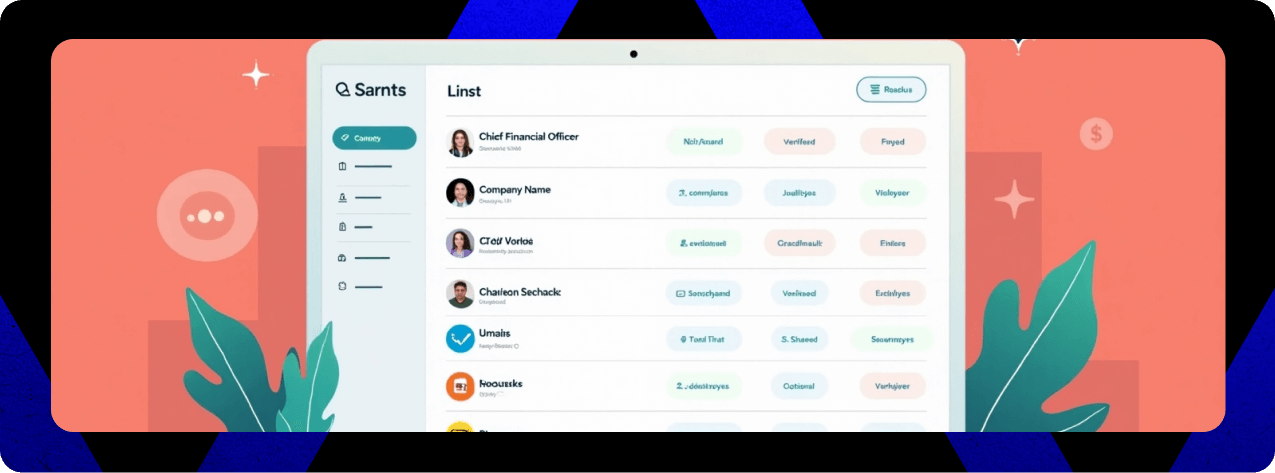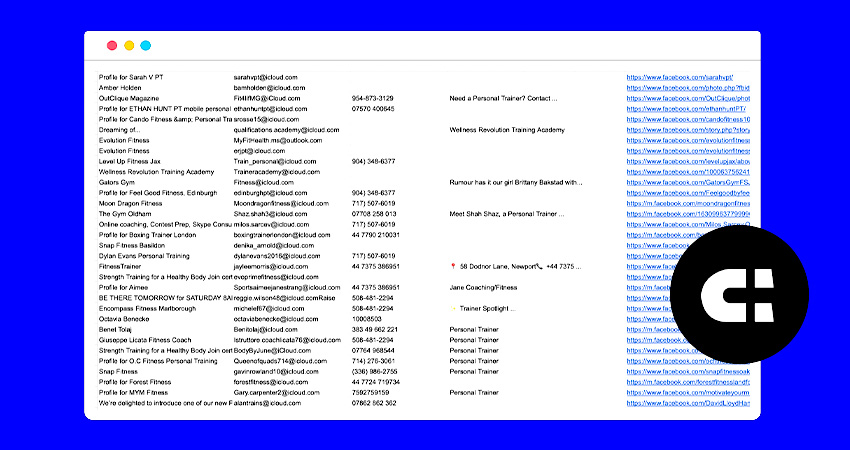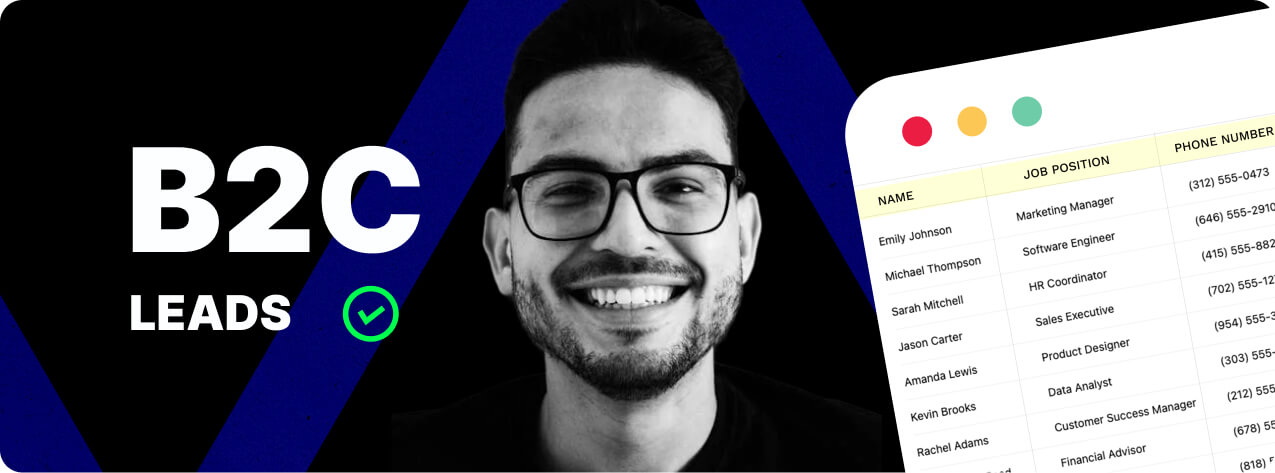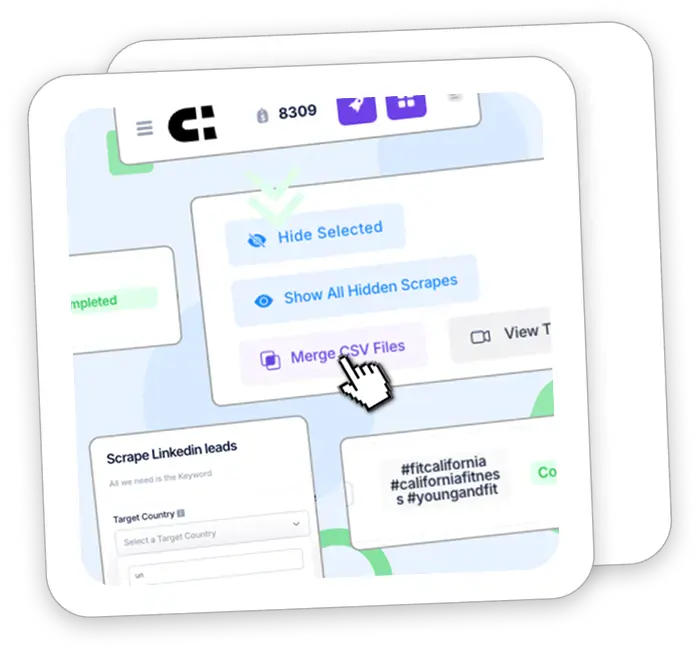B2B Lead Generation Solutions – Guide for 2025

If you’re in B2B and need more customers, you don’t have a lead problem. You have a lead-gen problem. In this guide, we review the best B2B lead generation solutions to help businesses attract qualified leads, improve lead quality, and drive higher conversion rates.
There are many ways to get new prospects in the door using modern B2B lead generation solutions, but not all of them work the same. Some are fast but expensive, others are slow but scalable, and some tools look great until you realize they’re built for enterprise teams with six-figure budgets.
That’s why we built this guide: to help you compare the best B2B lead generation solutions and services in 2025 : to help beginners (and even seasoned marketers) determine which B2B lead generation services and tools are relevant in 2025 and how to use them effectively.
We’ll walk through different types of solutions – including IGLeads’ B2B Scraper tool – strategies, and companies worth knowing — plus show you a flexible, cost-effective option at the end if you want to build custom lead lists on your terms.
What Types of B2B Lead Generation Solutions Can You Take Advantage of?
Let’s break this down by how you plan to generate leads — and which B2B lead generation solutions best fit your strategy, what tools you’ll use, who you’re targeting, and how hands-on you want to be.
By Outreach Type
Inbound Lead Generation
Inbound lead generation is when prospects discover your business organically, usually through helpful content, SEO, or social media. Instead of reaching out directly, you’re attracting people already searching for your products or services, then converting these qualified leads through value-driven content, email marketing, and strategic touchpoints that support your lead generation process.
Examples:
- HubSpot – Combines content marketing, landing pages, and CRM features to attract and manage inbound leads.
- Semrush – SEO platform that helps businesses grow organic traffic and generate qualified inbound prospects.
- ConvertKit – Offers landing pages, forms, and automation tools to capture and nurture subscribers.
Outbound Lead Generation
Outbound lead generation is the proactive approach, where you initiate contact with potential customers and potential leads through channels like cold email or direct outreach. This includes cold emailing, DMs, phone outreach, or targeted advertising. It’s especially effective for reaching people who aren’t actively searching but fit your ideal client profile.
This method helps you reach your target audience even before they actively search for your solution.
Examples:
- Lemlist – Automates cold email outreach with smart personalization to improve reply rates.
- LinkedIn Sales Navigator – Helps identify and connect with high-quality B2B prospects based on job titles and industries.
- Instantly.ai – A powerful cold outreach tool designed for high-volume campaigns and lead segmentation.
By Tool Type
Scraping Tools
Scraping tools help you automatically collect data—like names, emails, and phone numbers—from platforms like LinkedIn, Google Maps, and Instagram. These tools are perfect for building targeted lead lists without hours of manual research.
Examples:
- IGLeads.io – Scrapes leads in real time from Google Maps, Instagram, and LinkedIn based on niche and location.
- PhantomBuster – Automates data scraping and interactions across social media and web apps.
- Apify – A web scraping and automation platform that supports large-scale data extraction projects.
Email Finder Tools
These tools help you find verified email addresses using names, domains, or LinkedIn URLs. They’re ideal for outbound prospecting and reduce the bounce rate of your cold emails by ensuring accuracy.
Examples:
- Hunter.io – Finds professional emails and verifies deliverability for cold outreach.
- Snov.io – All-in-one email prospecting tool with search, verification, and CRM features.
- VoilaNorbert – Helps locate and confirm email addresses for lead generation and sales outreach.
Marketing Automation Platforms
These platforms let you attract, capture, and nurture leads through automated workflows, forms, and campaigns. They combine CRM, email marketing, and lead scoring to move prospects efficiently through the sales funnel and improve overall lead quality.
Examples:
- HubSpot – Offers a complete inbound marketing suite including email automation and lead tracking.
- ActiveCampaign – Known for advanced automation, email sequences, and lead segmentation tools.
- Marketo – Enterprise-level platform that manages complex lead nurturing and scoring processes.
Ad Platforms
Ad platforms allow you to run paid campaigns that capture leads through search, social, or display networks. When combined with strong landing pages and forms, they become powerful tools for demand generation.
Examples:
- Google Ads – Captures high-intent leads through search and local ads.
- Meta (Facebook/Instagram) Lead Ads – Lets users submit forms without leaving the app.
- LinkedIn Lead Gen Forms – Pre-filled forms for B2B leads, triggered by LinkedIn ads.
Live Chat & Conversational Tools
These tools convert website visitors into leads by initiating real-time conversations. They offer automated replies, qualify prospects, and help move people toward booking or conversion right on the site.
Examples:
- Drift – AI-powered chatbots and live chat tools focused on sales conversations.
- Intercom – Combines live chat, product tours, and automation to support lead capture.
- Tawk.to – A free, customizable chat platform to engage visitors and gather contact info.
By Audience Focus
B2B
Targeting businesses, decision-makers, and teams.
Common tools: LinkedIn, Apollo, IGLeads.io, ZoomInfo
B2C
Targeting individual consumers (often higher volume, faster decisions).
Common tools: Facebook Ads, ManyChat, Call tracking platforms
By Service Model
DIY (Do It Yourself)
You use the tools, do the outreach, and build the pipeline yourself.
Ideal for: small teams, early-stage companies
Tools: IGLeads.io, Lemlist, Hunter.io
DFY (Done For You)
An agency or platform handles the lead generation for you, including research, outreach, and appointment setting.
Examples:
- Belkins
- CIENCE
- Martal Group
Why B2B Lead Generation Solutions Matter in 2025
The way businesses use B2B lead generation solutions has changed dramatically over the past few years, and in 2025, it’s all about automation, personalization, and precision.
The Rise of Automation & AI
Modern B2B buyers don’t have time for vague outreach. That’s why lead generation tools now lean heavily on AI, automation, and intent data. Platforms can identify buying signals, personalize emails at scale, and even trigger outreach the moment a prospect engages with your site or LinkedIn page.
If you’re still relying on spreadsheets and cold calling, you’re not just behind, you’re invisible.
The High Cost of Unqualified Leads
A bloated list of random contacts isn’t a real lead list; it drains resources and reduces lead quality, wasting your sales teams’ time and hurting performance. Chasing unqualified leads can crush your sales team’s productivity and burn your email reputation. Quality beats quantity every time.
Focusing on high-quality, verified data ensures better engagement and higher conversion rates.
A good lead generation service helps you avoid this by focusing on data quality, niche relevance, and verified contact information.
Outsourcing vs. Building Internally
Hiring, training, and managing an in-house lead gen team takes serious time and money. That’s why many startups and lean teams choose to outsource — it’s faster, often cheaper, and lets your sales team focus on closing, not hunting.
Still, outsourcing isn’t one-size-fits-all. In some cases, building a hybrid model with internal tools and external help (like scraping + appointment setting) gives you more control and better ROI.
Top B2B Lead Generation Strategies
There’s no winning strategy, just the one that works best for your audience, sales cycle, and resources.Each of these approaches supports a healthy sales pipeline and can be adapted to fit your lead generation campaigns and target audience.
Here are some of the most effective B2B lead generation approaches in 2025:
Cold Email & Outbound Outreach
Still, one of the fastest ways to generate interest, especially with the right targeting. Pair a tool like IGLeads.io or Apollo to build your list, then use Lemlist or Instantly for automated, personalized sequences.
SEO & Inbound Content Marketing
Attract leads who are actively searching for solutions. Content marketing and SEO work together to generate long-term inbound visibility, ensuring a steady flow of qualified leads without paid ads. With a blog, a few high-ranking landing pages, and a lead magnet or form, you can generate consistent inbound leads with no ongoing ad spend.
LinkedIn Prospecting & Social Selling
Perfect for B2B. Search by industry, title, or company size. Use tools like Sales Navigator, PhantomBuster, or IGLeads to streamline the process. Follow with value-based outreach, not just pitches.
PPC & Retargeting
If you’ve got budget, paid ads on Google, Facebook, or LinkedIn can drive traffic to lead forms or booking pages. Combine it with retargeting to bring back visitors who didn’t convert the first time.These ad-based lead generation campaigns can quickly drive awareness among potential leads while complementing organic outreach.
Web Scraping & Automation
Build niche-specific lead lists in real time using platforms like IGLeads.io. Scrape LinkedIn for CFOs, Instagram for real estate agents, or Google Maps for local businesses — then reach out via email or DM.
This is one of the most cost-effective and scalable ways to generate B2B leads today, especially for small teams or consultants.
Choosing the Right B2B Lead Generation Solution for Your Business
With so many tools, services, and strategies available, it’s easy to get overwhelmed. The right B2B lead generation solution depends on your goals, resources, and how hands-on you want to be.
When to Consider a Lead Generation Service
You should consider using a lead gen service if:
- You’re short on time and need leads fast
- Your team lacks experience in prospecting or cold outreach
- You want to book sales calls without hiring full-time staff
- Your internal campaigns aren’t producing consistent results
Working with a reputable lead generation agency or partner can help you generate qualified leads faster without sacrificing personalization. Services like Belkins, Martal Group, or CIENCE can handle everything from list building to outreach and appointment setting — ideal if you want a “done-for-you” solution.
What to Look For in a Provider
Not all lead generation services are created equal. Here’s what to look for:
- Niche targeting – Can they find leads in your industry or ICP (ideal customer profile)?
- List quality – Do they verify emails? Are the contacts up to date?
- Outreach method – Is it personalized or templated? Manual or automated?
- CRM/Tool integrations – Will their service plug into your sales stack?
- Reporting & transparency – Do they provide performance data or just deliver leads?
A solid provider should act like an extension of your sales team, not just dump contacts in your inbox.
Warning Signs of Low-Quality Providers
Avoid companies that:
- Promise huge volumes with no filters
- Refuse to verify how leads are sourced
- Won’t show you sample leads
- Offer outdated static databases
- Lack of clarity on targeting or delivery timelines
It probably is if it sounds too good (or cheap) to be true.
Comparison of the Best B2B Lead Generation Tools in 2025
Whether you want to DIY your prospecting or plug into a full-service provider, here’s a quick breakdown of the best B2B lead gen tools and services available in 2025:
| Tool / Service | What It Does | Best For |
| IGLeads.io | Real-time lead scraping and contact export from LinkedIn, Google Maps, Instagram | Solo founders, small teams, and niche targeting |
| Belkins | Done-for-you lead research and appointment booking | Agencies, B2B service providers |
| CIENCE | Fully managed outbound sales service (email + SDRs) | Mid-sized companies needing full outreach |
| Martal Group | Tech-focused sales outsourcing for B2B companies | SaaS and enterprise tech companies |
| Cognism | GDPR-compliant data platform with intent-based filters | EU-focused teams with strict data needs |
| UpLead | Contact database with real-time verification | SMBs that want to build lists quickly |
| Apollo | Prospecting + email sequencing + database in one | Sales teams that want an all-in-one tool |
| RocketReach | Contact lookup and email discovery across company websites | Startups and recruiters |
| PhantomBuster | Automation scripts for LinkedIn, Instagram, and more | Tech-savvy users who want scraping + actions |
| ZoomInfo | Massive B2B contact database + intent + firmographic filters | Enterprise companies with large sales ops |
| Lemlist | Cold email outreach with personalization at scale | Outbound marketers focused on replies |
| Hunter.io | Email finding and verification tool | Email marketers and recruiters |
If you’re just starting out, IGLeads.io offers one of the most flexible, cost-effective ways to generate leads without committing to high monthly fees or long onboarding processes.
Cost-Effective B2B Lead Generation Solutions for Small Businesses
If you’re running lean or bootstrapping, you don’t need to burn thousands a month to generate B2B leads. Here are practical, budget-friendly B2B lead generation solutions for small businesses to help you get results without breaking the bank:
DIY Lead Generation Using Tools
Instead of paying per lead, you can use affordable tools like:
- IGLeads.io to scrape fresh contacts
- Hunter.io to find and verify email addresses
- Lemlist or Instantly to send automated cold emails
This gives you full control over your targeting and messaging at a fraction of the cost of hiring an agency.
Build Smaller, High-Intent Lists
You don’t just need thousands of leads, you need the right ones. That’s why smart businesses combine scale with precision:
- Target specific industries, roles, and company sizes
- Personalize your outreach to stand out
- Follow up consistently to build trust and convert.
With IGLeads, you can generate thousands of leads and filter for the highest-quality prospects, so every message hits the mark.
Combine Content + Outbound for a Hybrid Strategy
Publish helpful content such as case studies, landing pages, and blog posts, then use outbound outreach to connect with people who’ve visited your site or fit your ICP
Use tools like Google Analytics, LinkedIn, and PhantomBuster to identify and reach out to these prospects directly.
When (and When Not) to Buy a Lead List
Buy a list if:
- You trust the source
- The list is exclusive or freshly generated
- You need to fill pipeline fast
Avoid buying a list if:
- It’s static or outdated
- You can’t verify where it came from
- It’s shared with dozens of other companies
In general, it’s smarter to build your own list or use a tool that generates it in real time, like IGLeads.
How to Use IGLeads as Your B2B Lead Generation Solution
If you want a scalable, flexible, and affordable B2B lead generation solution to generate custom lead lists, IGLeads.io is one of the most effective B2B lead generation solutions to start with; no sales calls, no contracts, just actionable data.
Here’s how it works:
- Log into IGLeads.io – Create an account and choose your scraping source (LinkedIn, Google Maps, or Instagram).
- Set your filters – Target by job title (e.g., CFO, Marketing Director), industry, location, or keyword (e.g., “ecommerce,” “real estate agent”).
- Click “Scrape” – The system pulls real-time data based on your filters.
- Export your lead list – Download a clean CSV with full names, emails, job titles, company names, and links.
- Start outreach – Use your list with a cold email platform (like Lemlist or Instantly) or contact prospects directly on LinkedIn or Instagram.
This is a perfect option for founders, freelancers, marketers, and agencies who want full control and fresh data without long sales cycles or bloated software.If you’re looking for reliable B2B lead generation solutions, IGLeads.io helps your sales teams find qualified leads and achieve higher conversion rates — all with automated lead generation campaigns tailored to your target audience.
Explore more lead generation strategies and tools
- How to Build a High-Quality B2B Email List for Outbound Marketing
- Buy Email Lists for Marketing in 2025: Complete Guide to Business Leads
- Why Scrape Google Maps? Use Cases for Sales, Marketing & SEO
- B2C Lead Generation: The 2025 Playbook
- 15 Best Lead Generation Companies for 2025
- Best B2B email list providers in 2025
- Top Lead Generation Agencies Compared (2025)
- 18 Best B2B Lead Generation softwares in 2025
- Lead Generation Guide: Strategies & Tools for 2025
Find your email list by industry
- Get Fresh Veterinarians Email List 2025
- Get Fresh Chief Revenue Officers Email List 2025
- Get Fresh Banking Email List 2025
- Get Fresh Real Estate Email List 2025
- Get Fresh VP Email List 2025
- Get Fresh Retail Industry Email List 2025
- Get Fresh Chief Sales Officer Email List 2025
- Get Fresh Hospitals Email List 2025
- Get Fresh Healthcare Email List 2025
- Get Fresh Restaurant Email List 2025
- Get Fresh Chiropractors Email List 2025
- Get Fresh Hotels Email List 2025
- Get Fresh COO Email List 2025
- Get Fresh Contractors Email List 2025
- Get Fresh IT Decision Makers Email List 2025
- Certified Public Accountants Email List 2025
- Get Fresh Real Estate Agents Email List 2025
- Get Fresh Insurance Agents Email List 2025
- Get Fresh Mining Industry Email List 2025
- Get Fresh Chief Information Officers Email List 2025
- Get Fresh Pharmacists Email List 2025
- Engineers Email List: Reach Your Target Audience with Precision
- Get Fresh Mortgage Brokers Email List 2025
- Get Fresh HR Email List 2025
- Get Fresh Attorneys Email List 2025
- Oil And Gas Industry Email List 2025
- Chief Marketing Officer Email List 2025
- Email Extractor Ultimate Guide 2025
- CFO Email List – Get Targeted CFO Contacts in 2025
- How to Get a Homeowner Mailing List in 2025?
- Realtor Email List 2025
- Dentists Email List 2025
- Get Fresh CEO Email List 2025
- Marketing Directors Email List: How to Build and Use One for Your Business
Any Questions?
It depends. DIY tools like IGLeads start as low as $29, while done-for-you services can cost anywhere from $1,000 to $10,000+ per month, depending on volume and complexity.
If the list is fresh, targeted, and verified, avoid static or pre-bundled lists; they’re usually outdated or shared with others.
A tool (like IGLeads or Lemlist) gives you the power to do it yourself. A service (like Belkins or CIENCE) does the work for you, from research to outreach and scheduling.
Yes. You can automate a big part of the process with the right tools. Scrape leads, set up automated outreach, and follow up manually when needed.
If you’re early-stage and budget-conscious, IGLeads is one of the best ways to get started — you’ll get full control over targeting, plus fresh, usable data without long contracts.







